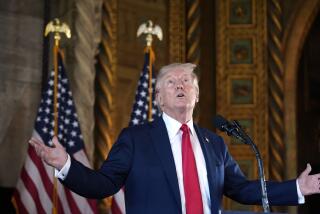New Way to Win, or Cyber-Hype?
- Share via
NASHUA, N.H. — Although the first caucus vote is three months away, the 2004 presidential campaign is already being hailed by some as the presidential Internet campaign. No question, the Internet has had a dramatic effect on the “invisible” primary season, the pre-voting phase of the nominating process during which political pundits, party leaders and donors decide which aspirants have what it takes to win in November. It’s become a political truism that it helped launch Howard Dean’s presidential candidacy, and the Internet was at least partly responsible for Wesley K. Clark’s entry into the race.
According to former Ambassador George Bruno, who played a leading role in Bill Clinton’s 1992 presidential campaign in New Hampshire and who is helping Clark, grass-roots Internet efforts to draft Clark gave his candidacy a credibility that it otherwise would not have enjoyed. The Dean precedent also encouraged the former general to seek the Democratic nomination by suggesting how he might overcome the handicap of entering the campaign late and without much money or organization.
Yet, there are strong reasons to believe that the Internet’s reputed transformative effects on electioneering may be overhyped.
Within days of Clark’s announcement, his campaign had a state-of-the-art Internet operation, headed by draft-Clark leader John Hlinko, up and running in Little Rock, Ark. A Clark campaign “blog,” managed by longtime blogger Cameron Barrett, soon followed.
Then, on Tuesday, after deciding not to compete in Iowa, Clark was in Nashua, N.H., engaging in old-fashioned retail politics. He said he planned to spend a substantial amount of time in the Granite State in recognition of its importance as the site of the nation’s first primary. A campaign staffer later told a reporter that the candidate would reach out to the rest of the country through satellite-fed interviews with local media. There was little mention of what role the Internet would play in furthering his candidacy.
Clark certainly plans to use the Internet to raise money, and the Internet team in Little Rock promises to turn the campaign’s Web sites into a new kind of virtual political community. But Clark’s presidential fortunes aren’t likely to hinge on further developments in cyberspace.
To understand why, it’s important to explore how and why the Internet contributed to Dean’s rise.
When he was still the relatively little-known former governor of Vermont, Dean shocked the Democratic political establishment when he reported raising $7.6 million in the quarter ending in June. The vast majority of his contributions were small and raised through the Internet. The fund-raising innovation catapulted him to the head of the Democratic pack and brought national attention to Dean’s Web-savvy campaign manager, Joe Trippi, and his Internet operatives.
Also during the quarter, the number of people using a Web site (www.meetup.com) to find places to learn more about Dean began growing dramatically. In March and April, about 7,000 individuals joined the Dean in 2004 Meetup list. By June, the total swelled to more than 19,000 new joiners; it subsequently peaked in August at 28,000. The Dean blog debuted in March, a first in presidential campaign history, but it too went relatively unnoticed until the fund-raising coup announcement in early July.
None of this had been planned. Zephyr Teachout, the campaign’s director of online organizing, started out working on traditional research and field operations. Blog master Mathew Gross, who wrote for the blog MyDD.com, just showed up in Burlington, Vt., and volunteered for general office duty. But as soon as Trippi and his cyber-oriented recruits discovered the power of the Internet to reach potential supporters and donors, the campaign moved to exploit them.
Dean’s early gains in name recognition and support owed much to the perception that his campaign was “cool” because it used the Internet in new ways. But as a senior member of a rival campaign explained, Dean’s Internet rep came about as a “perfect confluence of factors.” Most important, Dean’s anti-establishment, anti-Iraq-war message resonated with many in the group that is most digitally connected: younger, more affluent, better-educated voters.
The challenge Dean now faces is to reach voters who are not as cyber-active. According to a recent study by the Pew Internet and American Life project, 24% of Americans are “truly offline.” Typically, they are older, less well-off or unemployed, less educated, and Latino or black. These are precisely the groups targeted by Dean’s principal Democratic rivals.
In New Hampshire, Dean has won over non-Internet users, but his support there, as in Iowa, is chiefly because he has maintained a personal presence on the ground. Interestingly, the current big push on the Dean Web site is to get the campaign’s wired supporters to write letters to voters in Iowa and New Hampshire using snail mail. Meanwhile, the campaign began a new ad blitz in New Hampshire last week on another old medium -- television.
If Dean wins in Iowa and New Hampshire, the campaign’s Internet presence will definitely help him to build on his victories, but it probably won’t be nearly as influential as newspaper and magazine headlines and TV news stories. Conversely, if he flops in the two states, the Internet probably can’t save him, leaving Clark, the other Internet-spawned candidate, as a potential beneficiary.
Clark’s entry into the race generated a substantial amount of activity on the Internet. According to Meetup.com’s tallies, for example, more than 30,141 people joined the Clark in 2004 Meetup list in September and so far this month. By comparison, during the same period, 32,288 joined the Dean in 2004 list. Also, according to one Internet monitor, traffic on Clark’s Web sites surged in the weeks immediately after his Sept. 17 announcement, putting them ahead of all other campaign Web sites except Dean’s. Over the last week, however, with Clark forced to cut back on his public appearances because of laryngitis, traffic on his sites appears to have declined substantially.
Although the Clark campaign has had some success in raising money over the Internet, a significant amount of his contributions reported at the end of the last quarter came from traditional big Democratic donors, some of whom Clark had met with months before he decided to run. One indicator that Clark’s Internet team has a way to go before it will match Dean’s donor prowess is that one recent fund-raising challenge brought in less than $9,000 in its first four days.
As worrisome, the Clark team’s Internet activities have yet to generate the kind of buzz that Dean sparked over the summer. One reason may be the sudden resignation of Clark’s first campaign manager, Donnie Fowler, who reportedly charged that the campaign wasn’t doing enough to maintain and expand its grass-roots Internet base. Another may be that, despite his opposition to the administration’s policy in Iraq, Clark isn’t the kind of edgy anti-establishmentarian who appeals to online activists.
Because of its unmatched ability to facilitate communication, mobilize the committed and turn small contributors into counterweights to big donors, the Internet has become, for all candidates, an indispensable tool. But its ability to influence voters seems dependent on media it would supposedly replace. And it’s certainly no substitute for on-the-ground political operations.
The Internet may eventually foster new forms of democracy or presidential campaigning. But that will first require closing the still gaping digital divide between online users and the rest of the citizenry.
More to Read
Get the L.A. Times Politics newsletter
Deeply reported insights into legislation, politics and policy from Sacramento, Washington and beyond. In your inbox twice per week.
You may occasionally receive promotional content from the Los Angeles Times.










